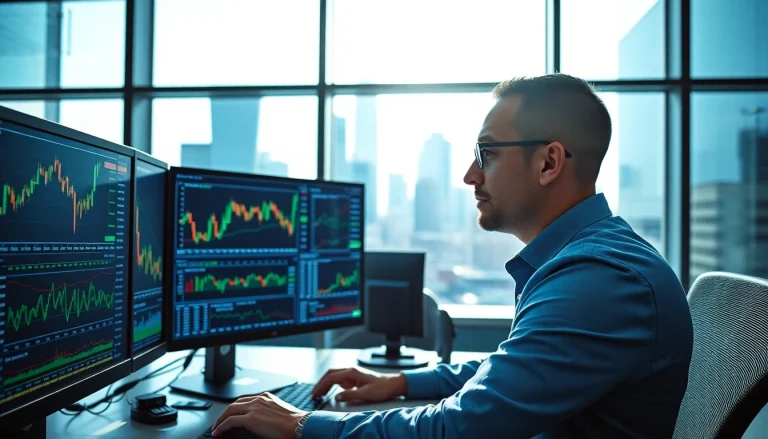Understanding Elite Trading
Definition and Importance
Elite trading is not merely a buzzword; it represents a strategic approach that separates successful traders from the masses. It involves a deep understanding of market dynamics, advanced analytical skills, and a disciplined mindset. In essence, elite trading is about maximizing profit potential while managing risks effectively. This approach is crucial because financial markets are inherently volatile and unpredictable. By adopting elite trading techniques, you can increase your chances of success and create sustainable wealth in the long term. As you delve into the world of elite trading, you’ll find that it’s characterized by a commitment to continuous education and adaptability to changing market conditions.
The Evolution of Elite Trading
The landscape of trading has undergone significant transformations over the past few decades. In the early days, trading was largely confined to physical exchanges, and the information available to traders was limited. However, the advent of technology has revolutionized how trades are executed, with online platforms providing real-time data and analysis tools at traders’ fingertips. This evolution has made elite trading more accessible, allowing anyone with a passion for the markets to engage in sophisticated trading strategies.
Moreover, the rise of algorithmic trading has introduced new dimensions to elite trading. Automated systems analyze vast amounts of data much faster than any human could and can execute trades based on predetermined parameters. This technological advance means that elite traders must now not only understand traditional trading skills but also embrace new technologies and analytical methods to maintain their edge.
Key Concepts and Terminology
For anyone looking to become an elite trader, familiarizing oneself with key terminology is essential. Terms such as “technical analysis,” “fundamental analysis,” “leverage,” and “risk management” form the foundation of trading knowledge. Technical analysis involves studying price movements and patterns to predict future behavior, while fundamental analysis focuses on economic indicators, news events, and financial statements to assess asset values.
Additionally, concepts like “risk-reward ratio” and “stop-loss orders” are vital for managing trades effectively. Understanding these terms enables traders to communicate better, develop and execute effective strategies, and ultimately improve their trading outcomes.
Essential Skills for Elite Trading
Technical Analysis Techniques
Technical analysis is a cornerstone of elite trading. This skill involves analyzing historical price data to identify trends and potential turning points. Several techniques form the basis for effective technical analysis:
- Charts: Line, bar, and candlestick charts provide visual interpretations of price data and trends over time.
- Indicators: Common indicators like moving averages, RSI (Relative Strength Index), and MACD (Moving Average Convergence Divergence) help traders interpret market momentum and potential reversals.
- Chart Patterns: Recognizing patterns such as head and shoulders, flags, and triangles can inform traders of potential future price movements.
Mastering these techniques enables elite traders to make informed decisions based on price action rather than emotional impulses.
Risk Management Strategies
In trading, risk management is paramount. Even the most skilled traders can experience losses, making robust risk management strategies crucial. Here are some key principles:
- Diversification: Spreading investments across various assets can mitigate risks associated with individual securities.
- Position Sizing: Determining how much capital to allocate to a specific trade based on individual risk tolerance and market conditions.
- Stop-Loss Orders: Using stop-loss orders can limit losses by automatically closing a position at a predetermined price level.
Implementing these strategies not only protects capital but also helps traders maintain a clear focus on long-term goals, preventing emotional decision-making in times of stress.
Psychology of Trading Success
The psychological aspects of trading are often overlooked but play a significant role in a trader’s success. Emotional resilience is vital in handling the pressures associated with elite trading. Traders must recognize how emotions like fear and greed can cloud judgment and lead to poor decisions.
Here are some psychological tips for aspiring elite traders:
- Self-Awareness: Understanding personal strengths and weaknesses allows traders to develop tailored strategies that work best for them.
- Discipline: Sticking to a trading plan and not deviating from it under emotional stress is critical for long-term success.
- Continuous Learning: The markets are ever-evolving; staying up-to-date with trends, technologies, and strategies can help in adapting effectively.
Committing to personal growth and maintaining emotional stability sets elite traders apart in a challenging environment.
Tools and Resources for Elite Trading
Best Trading Platforms and Software
The choice of trading platform can significantly impact a trader’s performance. An ideal trading platform should provide real-time data, advanced charting tools, and user-friendly interfaces. Here are some features to look for:
- Customizability: The ability to tailor the workspace according to individual preferences enhances trading efficiency.
- Research and Analysis Tools: Access to fundamental and technical analysis resources supports informed decision-making.
- Security Features: A robust platform should offer strong security protocols to protect personal and financial data.
Spending time to explore and select the right trading platform can set the groundwork for an elite trading journey.
Educational Resources and Courses
Education is indispensable in the world of elite trading. Trading courses, mentorship programs, and webinars provide essential insights and techniques. Courses are often tailored to specific areas such as technical analysis, day trading strategies, or psychological training.
Additionally, books authored by successful traders can offer invaluable wisdom and practical insights into navigating the markets. Engaging with various educational materials can substantially enhance a trader’s knowledge and skill set.
Community and Networking Opportunities
No trader is an island, and building a network of like-minded individuals can yield significant benefits. Networking offers opportunities for mentorship, idea exchange, and emotional support. Online forums, trading groups on social media platforms, and local trading meetups are excellent avenues for connecting with others. Sharing experiences, discussing strategies, and learning from peers can accelerate the learning process and enhance overall trading performance.
Common Challenges in Elite Trading
Overcoming Trading Fear and Anxiety
Fear and anxiety are natural emotions that can plague traders, especially those new to elite trading. The stakes are often high, and the possibility of losses can provoke these feelings. One effective way to manage fear is through preparation. Comprehensive analysis and a well-thought-out trading plan can instill confidence when making decisions.
Mindfulness techniques, such as meditation or journaling, can also help traders gain perspective and manage their emotions better. Embracing these methods transforms fear from a limiting factor to a motivating force.
Managing Expectations and Outcomes
Setting realistic expectations is crucial in trading. Many beginners enter the market with the aim of making a fortune quickly, but this attitude often leads to disappointment and frustration. Elite traders understand the importance of short- and long-term goals. Embracing patience and focusing on consistent performance rather than immediate results helps maintain a balanced outlook. Regularly reviewing trades, identifying patterns, and adjusting expectations accordingly enables traders to maintain motivation even during challenging periods.
Recognizing Trading Scams and Risks
The trading world, while vibrant, is not without its pitfalls. Scammers often prey on novice traders, promising high returns with minimal risk. It’s essential for traders to remain vigilant and conduct thorough research before committing funds or sharing personal information. Understanding typical signs of scams and being wary of unrealistic promises can protect traders from potential financial disaster.
Staying connected with credible trading communities and utilizing trusted resources can further shield traders from falling prey to scams.
Evaluating Your Elite Trading Performance
Establishing Key Performance Indicators
To gauge effectiveness in elite trading, establishing key performance indicators (KPIs) is vital. KPIs can include metrics like win rate, average profit per trade, and drawdown percentages. These figures enable traders to understand where they excel and where they need improvement.
By regularly assessing these metrics, traders can make data-driven decisions, refine their strategies, and clarify their trading objectives.
Reviewing Your Trading Journal
Maintaining a trading journal helps document and analyze trading decisions and outcomes. This practice promotes transparency in decision-making and helps traders understand their behavioral patterns. Detailed records of trades, including entry and exit points, reasoning behind decisions, and emotional states during trades, provide insights into areas of strength and those needing attention. Analyzing trade history regularly fosters a disciplined approach and highlights significant trends that can inform future strategies.
Adjusting Strategies Based on Results
Adaptability is a hallmark of elite trading. The market conditions change, and strategies that once worked may become less effective. Continuously evaluating and refining trading strategies based on personal and market performance is crucial for ongoing success. It is essential to remain open-minded, willing to test new techniques, and discard those that no longer yield desirable results. Staying agile in strategy implementation allows elite traders to navigate the ever-evolving trading landscape effectively.








